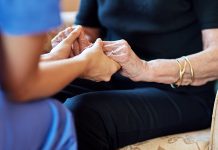The first nurses-to-be born this millennia* are now enrolling in nursing schools around the country.
One of these is Maeve O’Driscoll who is studying nursing at the Ara campus in Timaru.
Asked why she wanted to be a nurse her answer could have been from any nursing student since Florence Nightingale founded the first nursing school in 1860. “I just really wanted to make a difference in other people’s lives and help others in a positive way and have a positive outcome for them.”
How does she feel about recent headlines about nurses rallying and marching for safe staffing, poor pay and voting on strike action? “I think nurses should be paid a bit more because they work they have to do is so varied and they are always needed. What they do is pretty hard.”
Sam Tabak also born in the Year 2000 is studying at Ara’s Christchurch campus and agrees with Maeve.
“(Previously) I knew nurses didn’t get paid a lot but I didn’t know a lot about that. Then when I started I heard about the protests at the Canterbury DHB and I was a bit scared.”
“Nursing is the best job in the world where nurses do so much for patients but ironically they get so little. It’s cool to see people standing up and creating a new culture for nurses as I’m just starting my study.”
The biggest thing for Sam about starting nursing school has been adjusting to the huge study workload.
“I’m finding it really interesting. I’m finding the jump from school to tertiary so big. What we do in one week here is about what we did in half a year at high school. It’s a big adjustment.”
Maeve, who graduated from Roncalli College in Timaru last year is enjoying her studies but is also finding it hard to juggle part-time work and netball, with a big study workload. To prepare for nursing she took biology and physical education in her final year of high school. Her friends and family were really supportive of her decision to study nursing which she said helped reinforce that she had made the right decision for herself.
In another “first”, the two students both talked about how thankful they are that their first year of study coincided with the first year of the Fees Free policy.
“I’m so thankful…it really encouraged me to make the decision to go into nursing. It gave me a little bit of confidence as I go into my study as having to pay back less means that it won’t affect me as far into the future,” says Sam.
As well as staff shortages and pay issues these 2000 babies face – as perhaps every new generation of nursing does – new challenges. Both Sam and Maeve cite their generation’s adaptability as a strength, especially in relation to technology.
While it has been assumed that “internet natives” (people born since the internet became mainstream) would be more au fait with technology, a Dutch study released in late 2017 pointed to a need for as much training in technology for Millennials and Generation Z nursing students as is needed for Gen X and Y and baby boomer students.
The Internet-Generation Nursing Students’ View of Technology-Based Health Care study showed that when dealing with tele-technology Generation Z students had no more aptitude than anyone else despite being internet natives. It said there was specific training needed for younger students as well as older students with remote diagnosis, for example, means nurses don’t have the direct face to face contact where nurses gain so much information about their patients.
There will be changes ahead for these first year students but Sam and Maeve seem to have the right attitudes to handle them.
“My main purpose in choosing nursing, was to do something that gave me a reason to get up in the morning; and to do something that was fulfilling,” says Sam.
*While born in the new millennia there is debate about whether people born in 2000 are the tail-end of the Millennial generation cohort (who came of age in the Internet era) or the start of Generation Z or the post-Millennial generation.





















